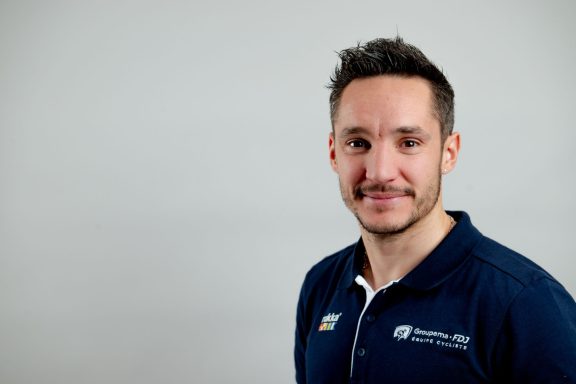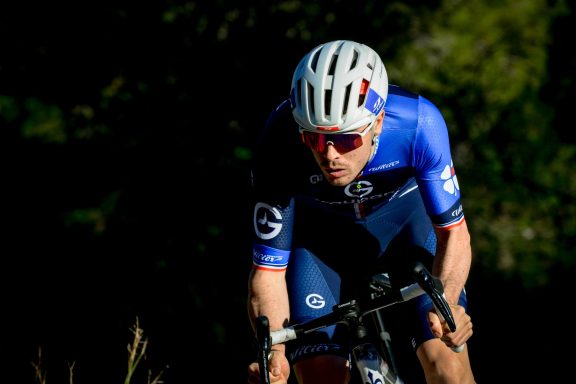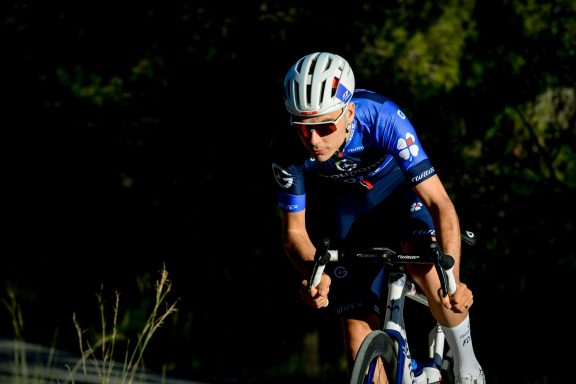Our overview of the Conti Groupama-FDJ’s talents continues. In this new episode, we focus on a young Swiss boy born in the year 2000, whose potential is unanimously recognized and has already enabled him to record very significant results, both on the road and in mountain biking. Alexandre Balmer is not just a hyperactive, extremely meticulous and heavily ambitious young man. The French-speaking Swiss is also known for speaking his mind. “I like to say what I think and add value to what I say rather than copy-paste what everyone recites”. You then can be sure to have a promising and pleasant time, as you’re about to get to know him.
On a bike, he is now one of the most skilled riders of his generation. But about fifteen years ago, like any child who tries his hand at the risky art of cycling, Alexandre Balmer experienced some difficulties to free himself from the famous and then essential stabilizer. What happened next belongs to history, or legend. “I don’t remember it myself, my mother told it to me,” warns Alexandre. “If I was able to ride a bike without the little wheels, it’s partly thanks to Franklin, the cartoon. You have that in France too, don’t you? It must have been ‘Franklin learns to ride a bike’. I watched it, went out and succeeded”. As the turtle teaches some kids how to tie their shoe laces, it similarly allowed the young Swiss to lay the foundations of what would very quickly become his main passion, inspired by his father, a sportsman himself and a decent rally driver. “He used to do mountain bike trips from La Chaux-de-Fond, where we live, to the French Riviera. Whenever my mother would stop to refuel him, I would go out with my little bike and ride in the parking lot”.
Road cycling by accident and trainings at dawn
The parking lots soon become too narrow for the young boy, who was dreaming of wide-open spaces and to follow his father’s wheel in the woods. Mountain biking comes as a natural choice and his first competitions occur at the age of 8, 9. Without being as meticulous and perfectionist as he is today – we will come back to this -, Alexandre Balmer still grabs his first victories then lines up at the Swiss Cup at 10 years old and wins the general classification of it the following year. The machine is started and won’t stop anymore. On the contrary, it gets perfected and professionalized. The most convincing proof being his European champion title in mountain biking during his first year as U17. “Until then, I was only doing mountain bike, but when I joined the Swiss team, cyclists from road and mountain bike were gathered. I had never been on a road at that point, I couldn’t see myself doing it and I didn’t even have a bike. During our first training camp, I actually took my father’s”. The following year, he gets one for himself, especially for the Swiss road championships. “Because they were mandatory,” he specifies. “It was a really difficult course, in Martigny, with quite a few climbs… and I won.”
It is then by default, under duress even, that he got in touch with road racing where he discovered new abilities and perspectives. “I started to have fun, especially when the road was going up,” he recalls. “In the wake of the Swiss championships, I did two podiums on the European Youth Criterium, in Luxembourg. I immediately was successful and that is also why I carried on.” Alexandre Balmer is 16 years old when he decides to simultaneously practice road cycling, mountain biking, and … school, obviously. “I did a poly-mechanic apprenticeship with ‘’integrated maturity’’, which gives the opportunity me to continue until the engineer degree,” he explains. “I have just finished my studies and it has been four very difficult years. Without my parents’ help, it would have been impossible for me to carry out this dual sport-study project.” He explains in depth: “I used to start in the morning at 7am, so I would often go train before, from 5 to 6. I would finish at 4pm at the earliest, but I would work overtime to be able to take vacations and then do competitions. When I would leave work, my father would bring me my bike and I would go training straight away. My mother would prepare all my meals. I would come back, eat, and go to bed at 9 p.m. Those were pretty strenuous days.”
Driven by pain and the 2024 Olympic Games
Alexandre Balmer could have taken the easy option by going to high school, where high-level athletes get planning adjustments, but he favoured his convictions. “Today I have a diploma”, he proudly says. “And I wanted to do something with my hands rather than learn when Napoleon Bonaparte was born”. He definitely wants to return to his studies at one point, but he confesses that his focus is now clearly on cycling. It was indeed not his main activity in the past when he managed to make a string of trophies: in 2017, he wins the Juniors time trial Swiss championship, finishes third in the road race, second in the well-known Classique des Alpes Juniors and gets a podium on the Tour du Pays de Vaud. In the meantime, he takes silver at both Switzerland and European Mountain Bike championships. But the real recognition comes the following year. With verve, he wins the World and European titles in his beloved discipline while netting an impressive road season: time trial and road race Swiss champion, winner of the Three Days of Axel, silver medallist on the European Champ road race, fourth in the Tour du Pays de Vaud and on the demanding Innsbruck World Championship.
Eventually, both disciplines bring him pleasure and results, so much so that today he finds his happiness in each of them. “In mountain biking, I love the technical side”, says Alexandre. “You have to go fast uphill, downhill, and then the best one wins at the finish. There is less frustration. On the road, on the other hand, it’s more tactical, it’s more like a game, and that’s what’s cool about it. Also, a different rider wins everyday. In mountain biking, for the past four years, only four riders won in the World Cup rounds. On the road, it depends on the course, the team and the tactics. There are quite a few variables. What I like even more in road racing is that you get another chance everyday on a stage race. You have the opportunity to catch up and do better the next day”. “But overall,” he continues, “what I particularly like about cycling is the pain that you feel when you go beyond your limits, when you empty yourself completely. Also, being able to switch between the two disciplines brings me a lot of freshness, it keeps me motivated”. For the time being, he does not plan to make a choice between the two practices. Thoughtful and determined, the young man from the Neuchâtel canton knows his direction, and the path leading to it. “You can go from mountain biking to road racing but not the other way around,” he says. “I’ve always said that I’d like to do a career in both disciplines. But the road can wait, maturity comes later. Mountain biking is shorter, more explosive and you lose technique if you don’t practice it. Ideally, I would like to focus more on mountain biking until the Olympics in 2024. I will then close this chapter, I will be 24 years old, and I will commit myself completely to the road.”
Drawn to stage races
Having only competed in about “sixty” race days out of the woods since his first pedal strokes, Alexandre Balmer has still limited experience in this area. Even though his height (1.92m) won’t change and that he’ll have to deal with it, he finds it difficult to define what kind of rider he is or will be, especially since he only raced a bit within the U23 ranks. However, a lead stands out. “I see myself going for general rankings because I have a great recovery capacity,” he claims. “Nowadays, the pure climbers don’t necessarily win because you have to be strong against the clock, and I am not very heavy anyway (72 kg). Among the juniors, I swore only by the mountains. Obviously, I won’t be a pure climber, nor a pure rouleur, because some are stronger, but I see myself as GC rider like Dumoulin, compensating my weight in the climbs by my power”. One thing is for sure, the sprint is out of the equation. He doesn’t like elbowing and admits being too nice to manage to make room for himself in the final. Classics? This is yet another story. His few experiences certainly thrilled him, he even won the 3 Days of Axel as he was racing for the first time on cobbles, but his pragmatism takes over. “It takes a lot of preparation for a single, precise day, which can go wrong. I think it is a pity,” he argues.
If he doesn’t claim any model in professional cycling, Alexandre Balmer confesses to be inspired by a handful of riders, including Mathieu van der Poel and a certain Thibaut Pinot. Beyond the athlete, he actually looks for humanity in a sportsman. He says he witnessed it with Chris Froome, one day, on the Tour de Romandie, when he “continued to sign autographs even if it was cold and that the other [riders] went on their way”. He also admires Egan Bernal, and not just because he comes from mountain biking like him. “He’s full of modesty”, he says. “When he won the Tour, he first thanked his parents, he wasn’t there bragging”. Although being quite a talkative person and using a harsh vocabulary from time to time, Alexandre claims to be in the same vein. “I would like to stay close to people, that they are not afraid to come to me. If I am asked on the street if I am good at cycling, I will not start spit out what I have won. I’m going to say ‘well, I’m doing ok’. I like to be discreet. In addition, people who are not into sports might struggle to understand the work behind all this. They might think you win by snapping your fingers. That’s also why I don’t necessarily like showing off my achievements and explaining my job to people”. He then admits he got annoyed on a few occasions (Innsbruck, editor’s note) although he inherited the “calm and relativistic” side of his Brazilian mother. These occasional angers actually result from frustrations as high as his expectations.
“You can reach the top at any age”
“I have always been very ambitious,” he says. “The goal has never been to be professional but to achieve results. The rest would follow … When I go training, my goal is to improve as quickly as possible, to become a better rider every day, to increase my power data in order to reach the world elite as quickly as possible. You can reach the top at any age. If you give yourself the means for it, you can even get there quite quickly. In my opinion, the body has no limits. It’s mostly decided in the head, and I think that’s where my strength lies”. As a result, his range of possibilities remains huge at this point. “I like to be sincere, but it’s not being bold”, he adds. “So, if I want to be honest, in my mind, I have the goal of winning all the races I can win. I’m not just telling myself that the goal is to go WorldTour”. At 16, he’s already driven by this hunger for success when he puts down on paper his short, medium, long and… very long-term goals. The content will remain confidential but it is enough to figure him out. More surprisingly – or not -, this state of mind spreads far beyond sports. As an example, he obtained the best average of his school course over his entire canton. As another example, he follows a schedule tied up and framed to the minute, which between meals, napping and training – whose areas are perfectly delimited -, includes English, German but also … administrative duties.
“I am a perfectionist. I like to have busy days and to do something with my time. I always set myself goals and I try every day to be a better person, to do things that bring me something, to learn new things”, he tells us with surprising maturity. However, by himself, the young Swiss tempers: “I probably don’t think enough about the social part, although it does not bother me to be in my bubble, not being distracted and to focus on what I do. And then social networks annoy me … I impose a lot of restrictions and limits on my life to achieve what I want to achieve. All these sacrifices don’t bother me in themselves. In the end, if we do some, we might as well do them thoroughly to get a reward afterwards. If you only do them halfway, the reward is not guaranteed. I want to stack all the odds in my favour”. That obviously often leads him to being discontent. “If I fail an objective, it bothers me, I get frustrated but it also makes me want to go work again. But in training, I always want to do more, and sometimes it does not make sense. I now have a lot more free time than when I was in apprenticeship, so I would like to take advantage of that to train a lot more, much harder, but the coaches do not necessarily agree. I need to be slowed down but it sometimes makes me feel like I’m not training enough, and I can feel bad about it”.
“I’m proud to wear the Groupama-FDJ jersey”
Today, the young man who’ll turn 20 on May 4 seems to have found the right balance. After a promising first season within the U23, mainly focused on mountain biking (podium at the Swiss championship, top 10 at the World Championship), Alexandre Balmer went to do his national service, still mandatory in Switzerland. For four months last winter, he alternated the uniform with his cycling equipment, taking advantage of an adjustment for top athletes, before joining ‘’La Conti’’ Groupama-FDJ. “Jens [Blatter] contacted me last year but I had to finish my course,” he explains. “I chose to come here to learn my job as a cyclist. Besançon is an hour away from my home. They speak French, and it’s easier to learn the job’s basics. Finally, they were completely understanding of my wish to continue mountain biking, and they fully support me in this dual project. Everything was perfect. They’re a very professional team, with WorldTour roots, and when I’m going to ride with Groupama-FDJ equipment now, I’m proud. When I overtake people in training, they almost fall off their bike because they stare at my jersey. It’s a pride to wear it, to be able to ride with it and to say that I belong to the team of Thibaut Pinot, among others.”




No comment